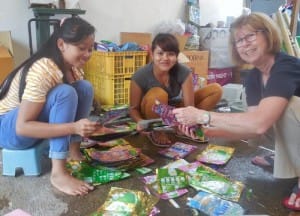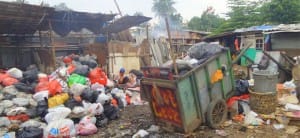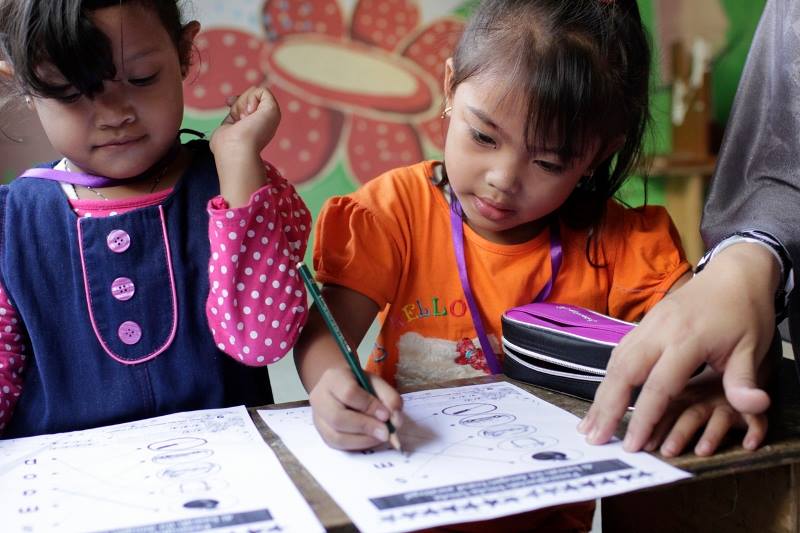Aiming to break the generational cycle of trash pickers, XS Project creates and sells products made out of waste materials. Despite serious obstacles, their priority stands at improving the livelihood of families, especially the children of the trash pickers.
Being a trash picker (pemulung) is not a ‘humane’ profession, but in Indonesia, thousands of people living below the poverty line, without qualifications, take on this role. In Jakarta, trash pickers earn approximately Rp.50,000 a day, an undoubtedly low income for anyone seeking to provide for their families. With such limited financial resources, not only are they unable to support their families, but they also face difficulties in satisfying their basic needs for health and education.
One of the harshest consequences of working as a trash picker is the inability to send their children to school. This eventually becomes a cyclical existence, as the children are unlikely able to break away this livelihood as well.
General Manager of XS Project, Retno Hapsari, believes that people’s tolerance for trash is responsible for trash pickers’ woeful conditions.
Regardless of the public’s sympathy for the pemulung, she thinks that many people fail to realise their true impact on trash pickers and their families.
“People just don’t have an understanding of what the impact is of abusing the environment,” she claims, which in turn leads to undeserved living conditions for the pemulung.
XS Project is a non-profit organisation wishing to improve the living standards of trash pickers. Although the environment remains their primary concern, it is the children of trash pickers that
they are most worried about, as they hold the key to breaking the generational cycle. To help eliminate the issue, they create useful products made out of waste materials, including plastic pouches, used billboards and car seat upholstery, and sell them; proceeds of which are given to families of the pemulung. Funds are allocated to school expenses, such as books, uniforms, school lunches and snacks, and transportation.
For the past 10 years, since XS Project first started its operations, Hapsari has noticed that companies have found ways to give themselves excuses for producing waste. Nowadays it appears that the amount of plastic produced is increasing because companies tend to compensate through recycling and corporate social responsibility (CSR) programmes to educate people about the environment. That being said, Hapsari believes these companies still miss the point of not producing waste in the first place.
Hapsari also feels that consumers should know better. “Even if the company creates this waste, the consumer should understand that they have to sort their rubbish,” she says. The problem is, even if consumers do separate their waste, the Government does not support them with a waste management system.
Some people have also made efforts to apply an eco-friendly way of living, but Hapsari thinks that when it comes to execution, many fail disastrously. She doubts if people actually understands how ‘going green’ actually works when in practice they still go to grocery stores and leave with plastic bags in their hands. “That is not ‘going green’. You are supposed to refuse using plastic and sort your waste,” she states.
At the end of the day, the question remains: how much can we do if we cannot keep up with the supply of waste, fostered by such a lack of understanding and subversive mindsets that overlooks trash as a problem?
 For XS Project, education certainly plays a prominent role in making sure that the children will not end up becoming trash pickers like their parents. Hapsari notes that the function of education does not merely apply to these children, but also to society as a whole. “The trash pickers’ condition is the impact of what you throw away,” she argues.
For XS Project, education certainly plays a prominent role in making sure that the children will not end up becoming trash pickers like their parents. Hapsari notes that the function of education does not merely apply to these children, but also to society as a whole. “The trash pickers’ condition is the impact of what you throw away,” she argues.
XS Project continues to help improve the livelihood of trash pickers by purchasing rubbish from them at above market prices, conducting health check-ups to make sure trash pickers and their families stay in good shape, and controlling the quality of products created for consumers. Most importantly, they count on education to guarantee the possibility for children to pursue a different pathway.
The day when waste no longer exists will understandably be the winning day for XS Project. Until then, they continue working on the betterment of the trash picker community, even though they are far from realising their victory. As Hapsari admits, “What we do is actually very small. But better than doing nothing.”
To support XS Project, you can purchase their products and make donations. For more information, visit www.xsproject-id.org




